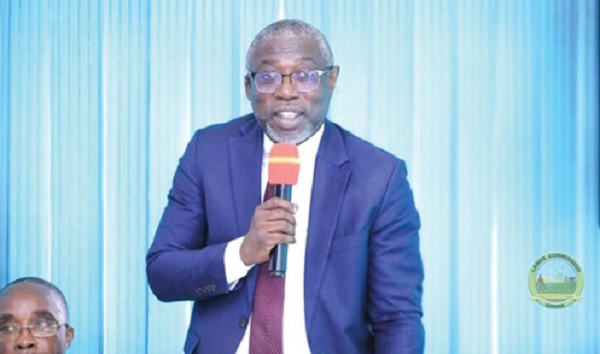Benjamine Arthur
The Land Commission has raked in a revenue of GH¢206,868,050.45 for 2023, a 12% increase of GH¢174,086,675.61 for the same period of 2022.
Executive Secretary of the Lands Commission, Benjamin Arthur, indicated at a meeting with stakeholders that the revenue target would increase pending approval of a 15% proposal before Parliament.
He was addressing a group of journalists, Commission staff members, the Chairman of the Parliamentary Select Committee on Lands and Forestry, the Deputy Minister of Lands and Natural Resources, and members of the National Lands Commission.
According to him, 2023 was filled with numerous challenges, but the strides made outweighed the setbacks.
To improve the Commission’s performance, it intends to strengthen what he refers to as the legislative and policy framework.
In view of that, he said a consultant was engaged by the Commission to prepare Legislative Instruments for the Land Act,2020 (Act 1036) and the Lands Commission Act, 2008(Act 767).
The first drafts of the Commission, he indicated, have been completed by the consultants, and submitted to the Lands Commission for further stakeholder engagements.
In response to the directive from the Minister for Lands and Natural Resources, a Committee was set up to draft a policy on public land management, for which draft policy had been completed, for onward submission to the sector ministry for consideration and approval.
When operational, he noted that the policy will guide the procedure and processes for the allocation and general management of state lands.
Again, Mr. Arthur observed that in line with the provisions of the Lands Act,2020, Act 1036, and on the Minister of Lands and Natural Resources’ directives, a committee was set up to make recommendations for divesting vested lands.
The Executive Secretary revealed that the Lands Commission (LC) as part of its digitalisation drive, has established a modernised land record management system.
The initiative which is aimed at fast-tracking land documentation, includes scanning, geo-referencing, and archiving of existing records.
In addition, the land-modernised system is expected to facilitate the retrieval of files for various purposes.
The digitisation drive, Mr. Arthur stated, is expected to facilitate the automated workflow processes of the Commission.
He maintained that the system will see a facelift in improving maps and spatial data.
Other benefits, Mr. Arthur stated, are to enable the Lands Commission to render services using a variety of digital platforms, automate workflow processes of the Commission, decentralise services to augment the Information and Communication Technology (ICT) infrastructure of the Lands Commission while retooling the Lands Commission by procuring state-of-the-art equipment, computers, servers, vehicles, and develop online access to the Lands Commission.
He was optimistic that the new system would facilitate a systematic recording/titling and verification.
This, he added, will speed up coverage and completion of land title records of the country.
According to him, the Commission prioritises training of employees in a bid to raise efficiency and performance.


